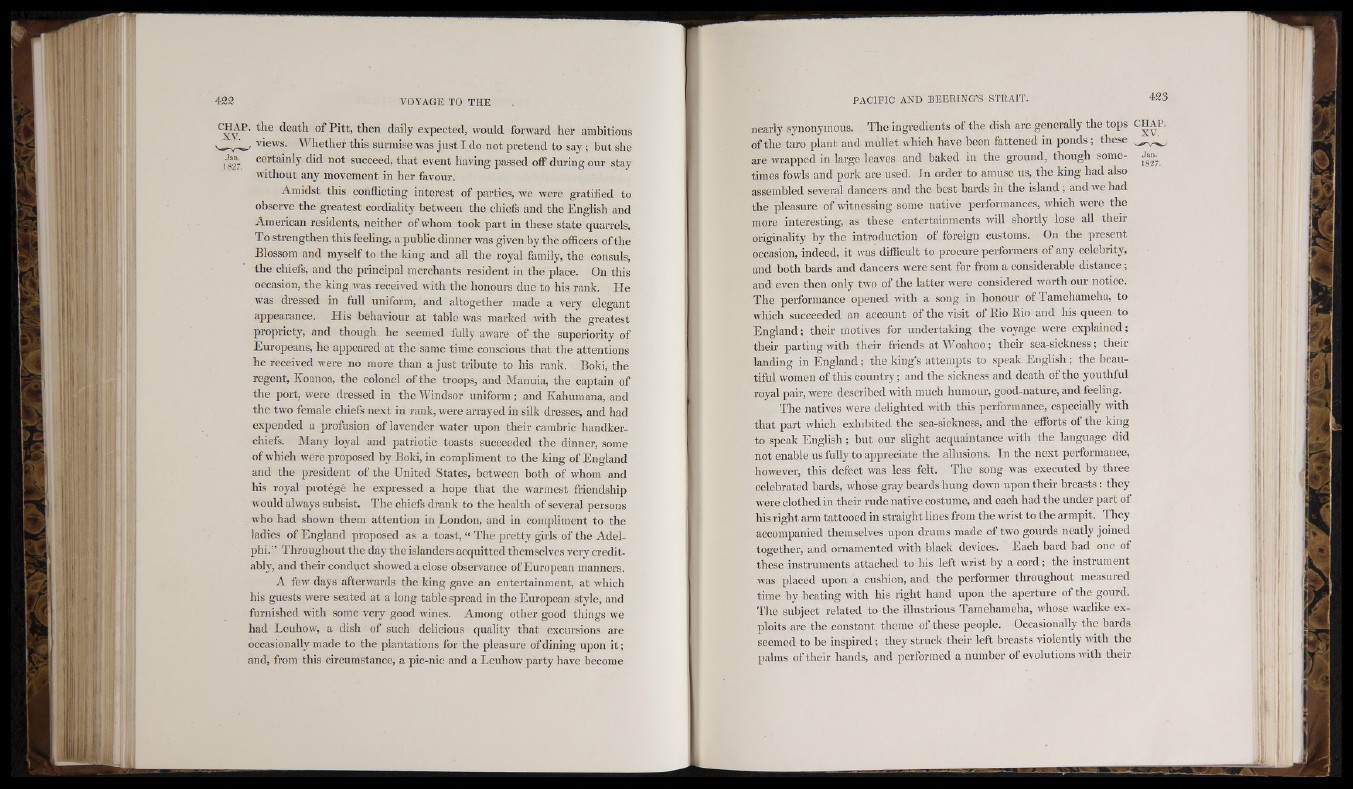
,1
death of Pitt, then daily expected, would forward lier ambitious
views. Whether this surmise was just I do not pretend to say ; but she
Jari_ certainly did not succeed, that event having passed off during our stay
without any movement in her favour.
Amidst this conflicting interest of parties, we were gratified to
observe the greatest cordiality between the cliiefs and the English and
American residents, neither of whom took part in these state quarrels.
To strengthen this feeling, a public dinner was given by the officers of the
Blossom and myself to the king and all the royal family, the consuls,
the chiefs, and the principal merchants resident in the place. On this
occasion, the king was received with the honours due to his rank. He
was dressed in full uniform, and altogether made a very elegant
appearance. His behaviour at table was marked with the greatest
propriety, and though he seemed fully aware of the superiority of
Europeans, he appeared at the same time conscious that the attentions
he received were no more than a just tribute to his rank. Boki, the
regent, Koanoa, the colonel of the troops, and Manuia, tlie captain of
the port, were dressed in the Windsor uniform ; and Kalmmana, and
the two female chiefs next in rank, were arrayed in silk dresses, and had
expended a profusion of lavender water upon their cambric handkerchiefs.
Many loyal and patriotic toasts succeeded the dinner, some
of which were proposed by Boki, in compliment to the king of England
and the president of the United States, between both of whom and
his royal protégé he expressed a hope that the warmest friendship
would always subsist. The chiefs drank to the health of several persons
who had shown them attention in London, and in compliment to the
ladies of England proposed as a toast, “ The pretty girls of the Adel-
phi.” Throughout the day the islanders acquitted themselves very creditably,
and their conduct showed a close observance of European manners.
A few days afterwards the king gave an entertainment, at which
his guests were seated at a long table spread in the European style, and
furnished with some very good wines. Among other good things we
had Leiihow, a dish of such delicious quality that excursions are
occasionally made to the plantations for the pleasure of dining upon it ;
and, from this circumstance, a pic-nic and a Leuhow party have become
nearly synonymous. The ingredients of the dish are generally the tops C H A P .
of the taro plant and mullet which have been fattened in ponds ; these
are wrapped in large leaves and baked in the ground, though some-
times fowls and pork are used. In order to amuse us, the king had also
assembled several dancers and the best bards in the island ; and we had
the pleasure of witnessing some native performances, which were the
more interesting, as these entertainments will shortly lose all their
originality by the introduction of foreign customs. On the present
occasion, indeed, it was difficult to procure performers of any celebrity,
and both bards and dancers were sent for from a considerable distance ;
and even then only two of the latter were considered worth our notice.
The performance opened with a song in honour of Tamehameha, to
which succeeded an account of the visit of Eio Eio and his queen to
England; their motives for undertaking the voyage were explained;
their parting with their friends at Woahoo ; their sea-sickness ; their
landing in England; the king’s attempts to speak English; the beautiful
women of this country; and the sickness and death of the youthful
royal pair, were described with much humour, good-nature, and feeling.
The natives were delighted with this performance, especially with
that part which exhibited the sea-sickness, and the efforts of the king
to speak English ; but our slight acquaintance with the language did
not enable us fully to appreciate the allusions. In the next performance,
however, this defect was less felt. The song was executed by three
celebrated bards, whose gray beards hung down upon their breasts : they
were clothed in their rude native costume, and each had the under part of
his right arm tattooed in straight lines from the wrist to the armpit. They
accompanied themselves npon drums made of two gourds neatly joined
together, and ornamented with black devices. Each bard had one of
these instruments attached to his left wrist by a cord; the instrument
was placed upon a cushion, and the performer throughout measured
time by beating with his right hand upon the aperture of the gourd.
The subject related to the illustrious Tamehameha, whose warlike exploits
are the constant theme of these people. Occasionally the bards
seemed to be inspired ; they struck their left breasts violently with the
palms of their hands, and performed a number of evolutions with their
I " ■ ; li.il ! I
iplli It